Stepping off Waiao (外澳) train station in Yilan County (宜蘭) and looking across the only road that runs through the town, if you’re vigilant, you’ll notice a small, beat-up orange sign in the shape of a surfboard with the words Surfing Hostel.
An hour bus ride from Taipei City Hall Bus Station (市府轉運站) to Jiaosi Township (礁溪), followed by a 12-minute train ride northbound to Waiao, transports you to a world where the skyline consists of mountain ranges instead of skyscrapers.
When I first visited this black sandy beach two and a half years ago with two other New Yorkers, we (rather stupidly) thought we had discovered an uninhabited surf spot. Back then, it seemed as if the only form of civilization was a small surf shop next to the train station where we rented our boards. After a few trips — and some notable hitchhiking memories including a time when I was convinced I was going to get my organs harvested — back to Waiao, the quiet beach town has somewhat transformed into a small, tightly-knit expat surf community.
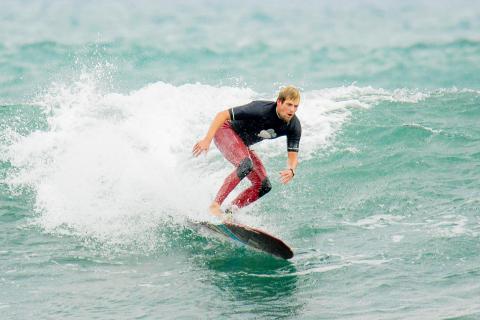
Photo Courtesy of Rising Sun Surf Inn
THE INN
At the center of the seaside buzz is the Rising Sun Surf Inn. It’s easy enough to find — just follow the beat-up orange sign and it will lead you to a small surf school-board rental-food and drink-hostel overlooking the ocean.
It also stands in stark contrast to the stretch of minimalistic, snazzy-looking boutique hotels with strange-sounding names further along the coastline. Some, like Play Hotel, are modern-vineyard style, with floor-to-ceiling glass windows and others, such as Dr’s Cave, are more Grecian.
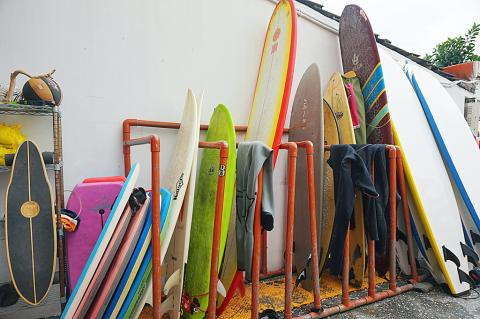
Photo: Dana Ter, Taipei Times
Rising Sun is as bright and cheery as its name sounds. Colorful boards for rent are stacked outside the inn next to an outhouse where surfers rinse off.
Inside, the stereo plays Led Zeppelin, and surfers — guys with blond hair and tattoos as well as Taiwanese guys and girls with nice tans — chat, sip Chinese tea and strum guitars at the bar and on the window-side couch.
The inn is run by Garrett Ball who hails from California and Sophia Yang (楊菲菲). The friends who stop by to visit tend to help maintain the inn, whether it’s by sweeping the floors or filling the refrigerator with IPAs and other brews.
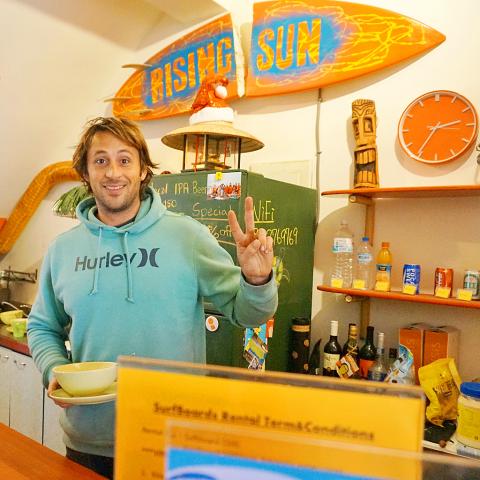
Photo: Dana Ter, Taipei Times
Rising Sun is the type of place that attracts backpackers and wandering souls who crave adventure and live on adrenaline. During my visit, my friend bumped into an acquaintance he had last seen while hitchhiking across the border from Thailand to Malaysia.
The close group of surfer-musician friends who frequent the inn are always finding ways to bring the community together and expand their reach. Last October, Rising Sun helped organize Waiao’s first Art & Music Festival. In addition to live music, there were arts and crafts displays and a percentage of the profits went to helping stray animals in Taiwan. Although it’s still the middle of winter, Ball is already planning Waiao’s first annual Seafood, Blues & Brews Festival on May 2 and May 3.
THE SURF
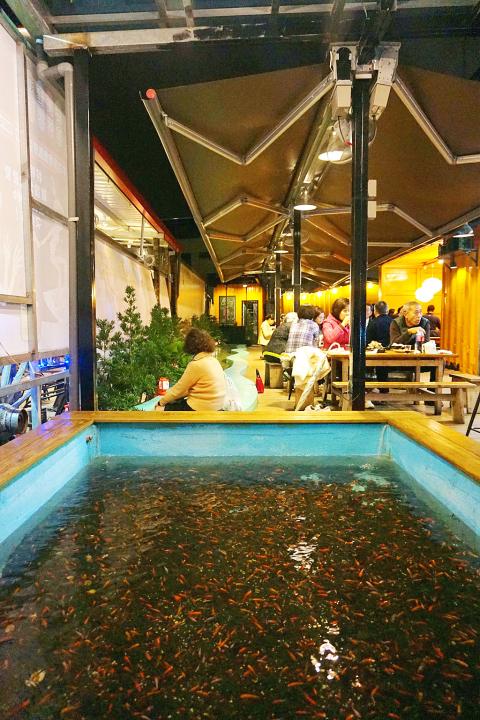
Photo: Dana Ter, Taipei Times
If all goes well with the festival planning, the beach will be hopping in May. However on most winter days, Waiao is largely deserted, making it ideal for surfing. Wetsuits — which you can rent along with surfboards at Rising Sun — are a must, although the water temperature in Waiao is surprisingly warm during the winter months. This will come as a nice surprise for people used to surfing in California and Australia where the water is freezing even during summer.
On the weekend I was there, the waves were choppy and most surfers, including experienced ones, spent most of their time flailing underneath the waves, rather than riding them.
As I quickly learned, surfing, especially in such a welcoming community like Waiao, is as much about soaking in the lifestyle as it is perfecting one’s hang ten. During winter in particular, it’s the post-surf bonding over hot soup and hoppy IPAs with friends and new acquaintances which make for interesting stories.
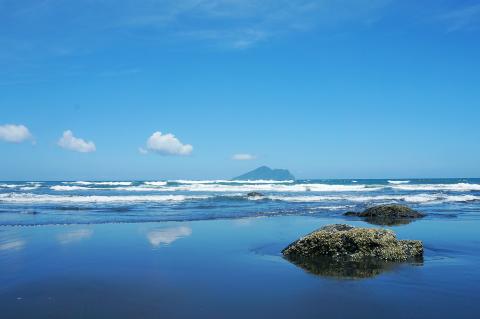
Photo: Dana Ter, Taipei Times
‘WINDOW SHOPPING’ FOR HOT SPRINGS
A fitting, laid-back way to end the night after an afternoon of winter surf — especially since you’ll already have a bathing suit on — is taking the train back to Jiaosi and soaking in one of the many public (or private) hot springs there.
A stone’s throw away from Jiaosi train station, you’ll find a thriving hot springs community without all the tourist hype of Beitou (北投). Jiaosi Hot Spring Park (礁溪溫泉公園) which has a number of public baths is a good place to start, but might be too cold for a wintery night. That being said, it’s never slim pickings because hot springs are integrated into every little nook and street crevice in Jiaosi. You can hardly turn a street corner without passing by a cafe with public hot springs or neon-lit signs which say “hot spring hotel” (mostly in Chinese). Even hot pot restaurants and ramen joints make their soup fresh from the hot springs.
The best way to approach it, according to some patrons at Rising Sun, is to “window shop” for a hot spring of your liking — whether it be a fish spa in the middle, a beer garden-cafe or a three or four star hotel with pay-by-the-hour options or overnight stays. As with most local hot spring hotels, each guest room has its own private hot spring tub.
The atmosphere can initially be hard to reconcile. On the one hand, there are families with young children running around and trying to catch the fish in the spas. On the other hand, we all know what romping goes behind closed curtains in those pay-by-the-hour hot spring hotels. Either way, the contradiction is simply part of the hot spring culture.
Winter surf, hoppy brews, hearty hot pots and steamy hot springs is not exactly a combination that comes to mind when planning your weekend getaway. But as any seasoned adventurer would know, it’s the unexpectedly stumbled-upon places which make for the best types of experiences — and the Waiao to Jiaosi “trek” which is still pretty untapped will give you just that kind of rush.
Getting there:
■ Take the bus from Taipei City Hall Bus Station (市府轉運站) to Jiaosi (礁溪), then the train three stops northbound to Waiao (外澳). Total commute time is slightly over an hour and costs NT$90
■ The train from Taipei Main Station (台北車站) to Waiao costs from NT$115 to NT$140. Total commute time is around 90 minutes
■ It’s easy to commute back and forth between surfing in Waiao and the hot springs in Jiaosi by train. One-way tickets cost NT$15
Surf rental information at Rising Sun Surf Inn (includes wetsuit during winter):
■ NT$500 per day for a softboard
■ NT$600 per day for a hardboard. Must have a minimum 6 months of surfing experience to rent
Accommodation:
■ Day trips from Taipei are highly feasible, but if your day trip ends up being an overnight affair, there are plenty of decent hostels, hotels and pay-by-the-hour type deals in both Waiao and Jiaosi clustered around the train stations. Prices range from NT$800 to NT$3,000
What to bring:
■ Bathing suit, warm clothes (during winter), flip-flops to change into, towel, sunscreen

The canonical shot of an East Asian city is a night skyline studded with towering apartment and office buildings, bright with neon and plastic signage, a landscape of energy and modernity. Another classic image is the same city seen from above, in which identical apartment towers march across the city, spilling out over nearby geography, like stylized soldiers colonizing new territory in a board game. Densely populated dynamic conurbations of money, technological innovation and convenience, it is hard to see the cities of East Asia as what they truly are: necropolises. Why is this? The East Asian development model, with

June 16 to June 22 The following flyer appeared on the streets of Hsinchu on June 12, 1895: “Taipei has already fallen to the Japanese barbarians, who have brought great misery to our land and people. We heard that the Japanese occupiers will tax our gardens, our houses, our bodies, and even our chickens, dogs, cows and pigs. They wear their hair wild, carve their teeth, tattoo their foreheads, wear strange clothes and speak a strange language. How can we be ruled by such people?” Posted by civilian militia leader Wu Tang-hsing (吳湯興), it was a call to arms to retake

This is a deeply unsettling period in Taiwan. Uncertainties are everywhere while everyone waits for a small army of other shoes to drop on nearly every front. During challenging times, interesting political changes can happen, yet all three major political parties are beset with scandals, strife and self-inflicted wounds. As the ruling party, the Democratic Progressive Party (DPP) is held accountable for not only the challenges to the party, but also the nation. Taiwan is geopolitically and economically under threat. Domestically, the administration is under siege by the opposition-controlled legislature and growing discontent with what opponents characterize as arrogant, autocratic

When Lisa, 20, laces into her ultra-high heels for her shift at a strip club in Ukraine’s Kharkiv, she knows that aside from dancing, she will have to comfort traumatized soldiers. Since Russia’s 2022 invasion, exhausted troops are the main clientele of the Flash Dancers club in the center of the northeastern city, just 20 kilometers from Russian forces. For some customers, it provides an “escape” from the war, said Valerya Zavatska — a 25-year-old law graduate who runs the club with her mother, an ex-dancer. But many are not there just for the show. They “want to talk about what hurts,” she